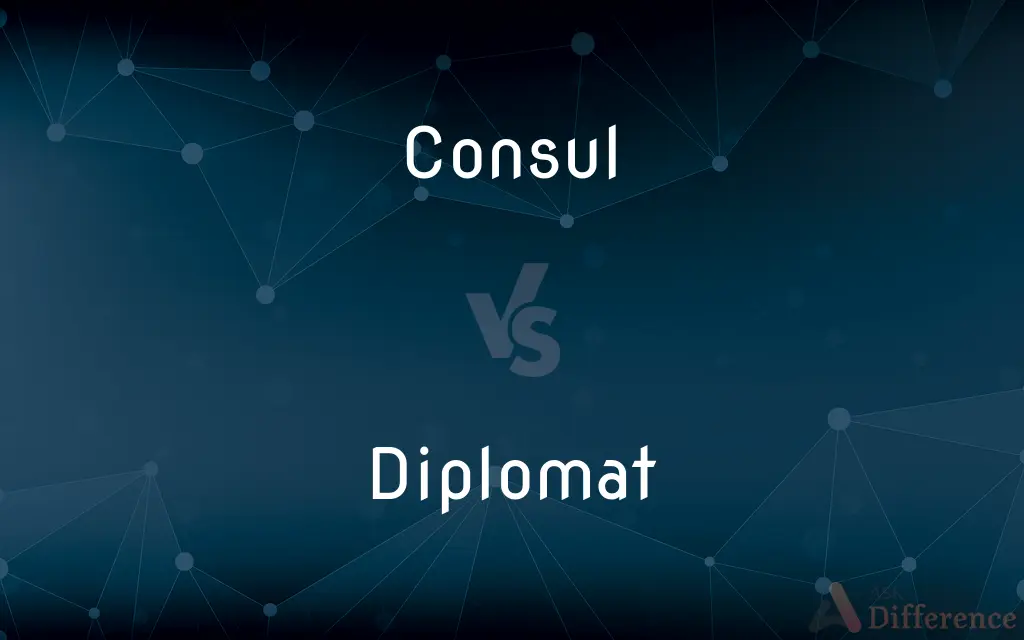Consul vs. Diplomat — What's the Difference?

Difference Between Consul and Diplomat
ADVERTISEMENT
Compare with Definitions
Consul
Consul (abbrev. cos.; Latin plural consules) was the title of one of the two chief magistrates of the Roman Republic, and subsequently also an important title under the Roman Empire.
Diplomat
A diplomat (from Ancient Greek: δίπλωμα; romanized diploma) is a person appointed by a state or an intergovernmental institution such as the United Nations or the European Union to conduct diplomacy with one or more other states or international organizations. The main functions of diplomats are: representation and protection of the interests and nationals of the sending state; initiation and facilitation of strategic agreements; treaties and conventions; promotion of information; trade and commerce; technology; and friendly relations.
Consul
An official who is appointed by a government to reside in a foreign country and who represents the commercial interests of that government and assists that government's citizens in that foreign country. See Usage Note at council.
Diplomat
An official representing a country abroad.
Consul
Either of the two chief magistrates of the Roman Republic, elected for a term of one year.
ADVERTISEMENT
Diplomat
One, such as an ambassador, who has been appointed to represent a government in its relations with other governments.
Consul
Any of the three chief magistrates of the French Republic from 1799 to 1804.
Diplomat
One who uses skill and tact in dealing with others.
Consul
(historical) Either of the two heads of government and state of the Roman Republic or the equivalent nominal post under the Roman and Byzantine Empires.
Diplomat
A person, such as an ambassador, who is accredited to represent a government officially in its relations with other governments or international organisations
Consul
(historical) Any of the three heads of government and state of France between 1799 and 1804.
Diplomat
(figuratively) Someone who uses skill and tact in dealing with other people
Consul
(obsolete) A count or earl.
Diplomat
A diplomatist.
Consul
A councillor, particularly:
Diplomat
An official engaged in international negotiations
Consul
(historical) A member of early modern city councils in southern France and Catalonia.
Diplomat
A person who deals tactfully with others
Consul
(historical) An officer of the trading and merchant companies of early modern England.
Consul
(historical) An official in various early modern port and trading towns, elected by resident foreign merchants to settle disputes among themselves and to represent them to the local authorities.
Consul
(by extension) An official residing in major foreign towns to represent and protect the interests of the merchants and citizens of their country.
Consul
(obsolete) A high government official, generally either a coruler himself or a counsellor directly under the ruler.
Consul
One of the two chief magistrates of the republic.
Consul
A senator; a counselor.
Many of the consuls, raised and met,Are at the duke's already.
With kings and consuls of the earth.
Consul
One of the three chief magistrates of France from 1799 to 1804, who were called, respectively, first, second, and third consul.
Consul
An official commissioned to reside in some foreign country, to care for the commercial interests of the citizens of the appointing government, and to protect its seamen.
Consul
A diplomat appointed by a government to protect its commercial interests and help its citizens in a foreign country
Share Your Discovery

Previous Comparison
Emu vs. Llama
Next Comparison
Psychological vs. Mental















































